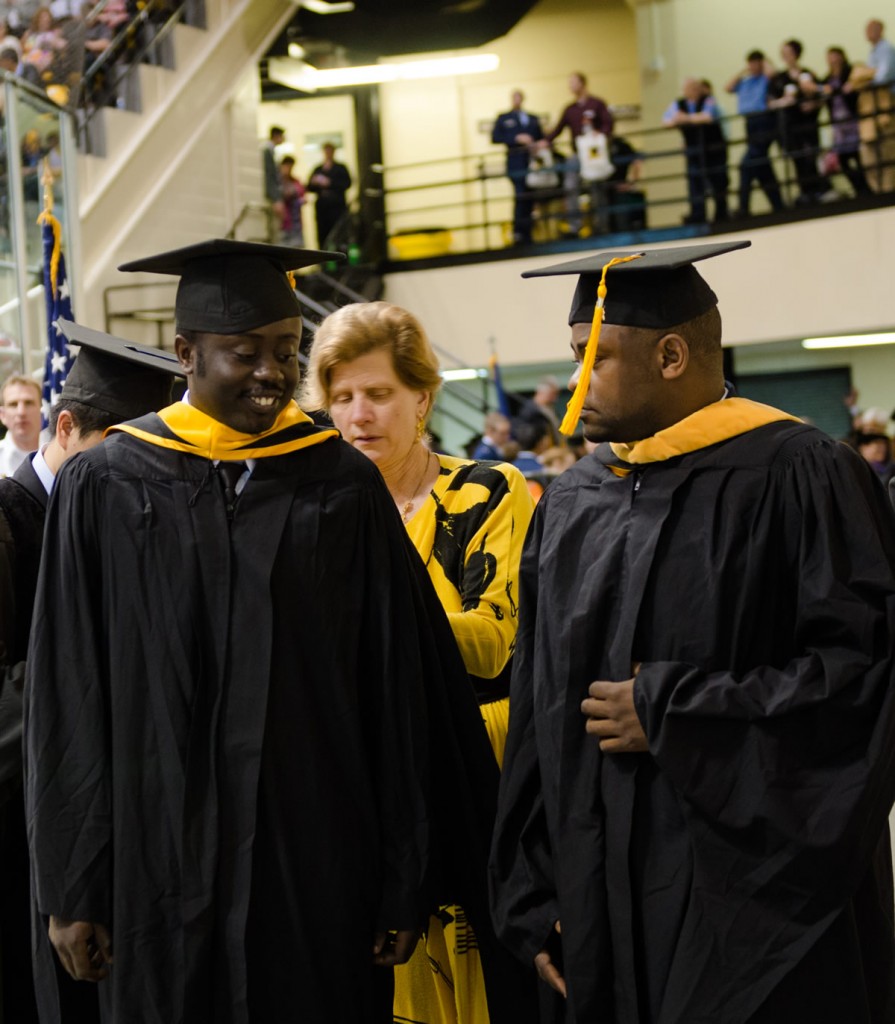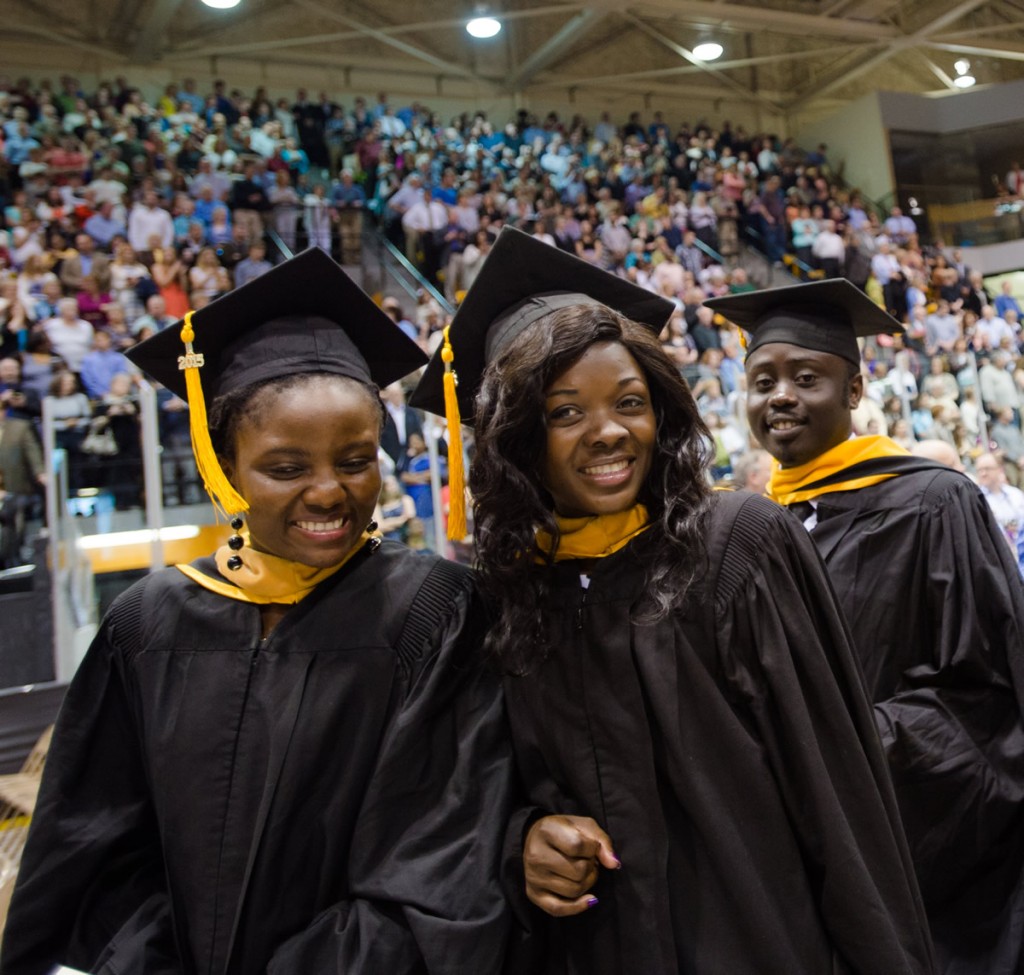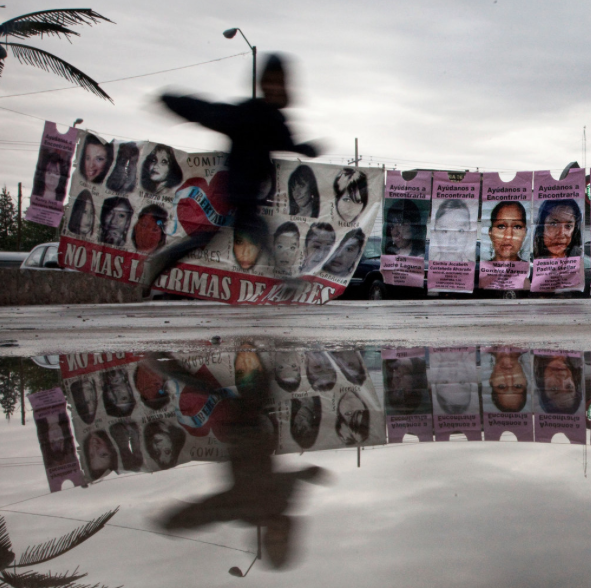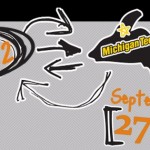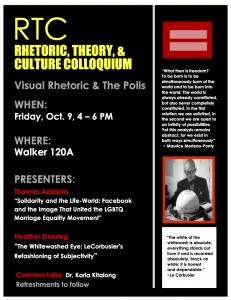 The Humanities Department’s Rhetoric, Theory and Culture 2015-16 Graduate Student Colloquium Series will be holding an event, “Visual Rhetoric in the Polis” on Friday, October 2, 2015 from 4-6 PM in Walker, Room 120A. Two of our esteemed graduate students, Thomas Adolphs and Heather Deering, will be presenting papers, respectively titled “Solidarity and the Life-World: Facebook and the Image that United the LGBTQ Marriage Equality Movement” and “The Whitewashed Eye: Le Corbusier’s Refashioning of Subjectivity.” Dr. Karla Kitalong will be offering commentary and moderating discussion. These papers both deal with questions about visual rhetoric and its political implications.
The Humanities Department’s Rhetoric, Theory and Culture 2015-16 Graduate Student Colloquium Series will be holding an event, “Visual Rhetoric in the Polis” on Friday, October 2, 2015 from 4-6 PM in Walker, Room 120A. Two of our esteemed graduate students, Thomas Adolphs and Heather Deering, will be presenting papers, respectively titled “Solidarity and the Life-World: Facebook and the Image that United the LGBTQ Marriage Equality Movement” and “The Whitewashed Eye: Le Corbusier’s Refashioning of Subjectivity.” Dr. Karla Kitalong will be offering commentary and moderating discussion. These papers both deal with questions about visual rhetoric and its political implications.
This event will inaugurate a series of colloquia in which graduate students and faculty will have opportunities to share their work in a format modeled on a typical academic conference panel. The goal here is, in part, to create opportunities for graduate students to gain experience presenting their work among peers and colleagues, but it is also hoped that this will be a venue for the sharing of scholarly work and questions across the various disciplines that make up our department. I hope that everyone will be able to attend and contribute to a lively, collegial discussion.
Light snacks and Dionysian refreshments will be provided. All are welcome.
Here are the abstracts for the papers to be presented:
“Solidarity of the Life-World: Facebook and the Image That United the LGBTQ Marriage Equality Movement”
This presentation will focus on the red and pink marriage equality logo, developed by the Human Rights Campaign’s to provide a sense of unity for the LGBTQ movement through digital space. The distribution of the logo began on March 25th, 2013, through the peer-to-peer website, Facebook. The intended symbolism of this event was, as described by the HRC, to display a sense of solidarity among the LGBTQ community and its advocates as the U.S. Supreme Court came to a decision on the case United States v. Windsor and Hollingsworth v. Perry. The response to this logo, however, could not have been predicted. Facebook saw a 120% increase in the number of profile images changed during only a twenty-four hour period, roughly 2.6 million individuals. Seemingly overnight, the red and pink logo was a cultural phenomenon, with corporate entities as diverse as Kenneth Cole and Bud Light displaying their support for the cause by replicating the logo with their own products. How and why did this viral event happen? What impact has the event had on our cultural cognition of LGBTQ rights after we “unplug” from our digital devices? By investigating the phenomenological theory of the life-world, it is the author’s intention to address such questions.
“The Whitewashed Eye: Le Corbusier’s Refashioning of Subjectivity”
In the initial stage of his architectural career, Le Corbusier promoted whitewashing as the communicative medium that could restore order and rationalism to the larger society. Through its ability to define the very lines of architecture and to erase impurities associated with expression of ethnicity and class, whitewashing was the means through which Le Corbusier desired to reform the human eye—to condition it to see that which was worthy of its gaze. This paper explores his work through Foucault’s theories of spatiality and subjectivity to address how whitewash could impact the larger society, leaving behind inscribed lines of class and racial segregation. Furthermore, through establishing this new way of seeing through the fashioned form of a rational human, Le Corbusier instituted a new subjectivity, a new inhabitant of living spaces. In an environment devoid of sensual identities, this human becomes the product of a systemic machine powered by pervasive binaries.
